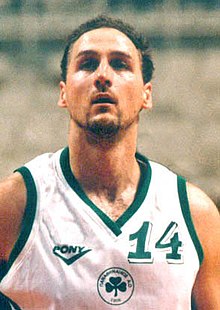Dino Rađa

Rađa taking a free throw for Panathinaikos in 1998.
|
|||||||||||||||||||||||||||||||||||||
| Personal information | |||||||||||||||||||||||||||||||||||||
|---|---|---|---|---|---|---|---|---|---|---|---|---|---|---|---|---|---|---|---|---|---|---|---|---|---|---|---|---|---|---|---|---|---|---|---|---|---|
| Born |
24 April 1967 Split, SR Croatia, SFR Yugoslavia |
||||||||||||||||||||||||||||||||||||
| Nationality | Croatian | ||||||||||||||||||||||||||||||||||||
| Listed height | 6 ft 11 in (2.11 m) | ||||||||||||||||||||||||||||||||||||
| Listed weight | 225 lb (102 kg) | ||||||||||||||||||||||||||||||||||||
| Career information | |||||||||||||||||||||||||||||||||||||
| NBA draft | 1989 / Round: 2 / Pick: 40th overall | ||||||||||||||||||||||||||||||||||||
| Selected by the Boston Celtics | |||||||||||||||||||||||||||||||||||||
| Playing career | 1985–2003 | ||||||||||||||||||||||||||||||||||||
| Position | Power forward / Center | ||||||||||||||||||||||||||||||||||||
| Number | 40, 14 | ||||||||||||||||||||||||||||||||||||
| Career history | |||||||||||||||||||||||||||||||||||||
| 1985–1990 | Jugoplastika | ||||||||||||||||||||||||||||||||||||
| 1990–1993 | Il Messaggero Roma | ||||||||||||||||||||||||||||||||||||
| 1993–1997 | Boston Celtics | ||||||||||||||||||||||||||||||||||||
| 1997–1999 | Panathinaikos | ||||||||||||||||||||||||||||||||||||
| 1999–2000 | Zadar | ||||||||||||||||||||||||||||||||||||
| 2000–2001 | Olympiacos | ||||||||||||||||||||||||||||||||||||
| 2001–2002 | Cibona | ||||||||||||||||||||||||||||||||||||
| 2002–2003 | Split CO | ||||||||||||||||||||||||||||||||||||
| Career highlights and awards | |||||||||||||||||||||||||||||||||||||
|
|||||||||||||||||||||||||||||||||||||
| Career NBA statistics | |||||||||||||||||||||||||||||||||||||
| Points | 3,733 (16.7 ppg) | ||||||||||||||||||||||||||||||||||||
| Rebounds | 1,883 (8.4 rpg) | ||||||||||||||||||||||||||||||||||||
| Assists | 356 (1.6 apg) | ||||||||||||||||||||||||||||||||||||
| Stats at Basketball-Reference.com | |||||||||||||||||||||||||||||||||||||
|
Medals
|
|||||||||||||||||||||||||||||||||||||
Dino Rađa (also Dino Radja, Croatian pronunciation: [ˌdǐːno ˈrâd͜ʑa]) (born April 24, 1967), is a retired Croatian professional basketball player. He was a member of the Jugoplastika team of the late 1980s and early 1990s, which he helped to win two EuroLeague titles. In the United States, he is best known for the three and a half seasons that he spent with the Boston Celtics of the NBA.
Rađa began his basketball life in his native town, as a junior at KK Dalvin. From there, he went on to KK Split to polish his professional career. He starred with Jugoplastika, as he and his friend Toni Kukoč led the team to win the pinnacle of European club basketball, the EuroLeague (then known as the FIBA European Champions Cup), twice in a row (1989 and 1990).
In late June 1989, the 22-year-old center got drafted by the Boston Celtics, in the second round, as the 40th pick of the draft. Right away, he publicly expressed his willingness to go to Boston immediately, "if the financial offer is good", and thus join fellow Yugoslavs Vlade Divac, Dražen Petrović, and Žarko Paspalj, who were also on their way to the NBA that summer. However, led by general-manager Josip Bilić, Jugoplastika was adamant Rađa would not be released, since they had him under contract until 1992. The entire case quickly turned into a months-long saga that played out in the Yugoslav media. The club's head coach, Maljković, even publicly called on the Yugoslav Basketball Association (KSJ) to adopt safeguard policies, preventing players younger than age 26 from transferring to NBA teams. After weeks of wrangling over his status, Rađa tried to force Jugoplastika's hand, by physically going over to the U.S., in early August 1989, and signing a one-year contract with the Celtics, reportedly worth in the neighborhood of $500,000. He also started practicing with the team at the Brandeis University facilities. However, seeing the situation as a clear case of contract poaching by Boston and its GM Jan Volk (who claimed Radja's contract with Jugoplastika was amateur and thus non-binding), the Split club wouldn't give up the legal fight, taking the case to the US District Court for the District of Massachusetts, seeking an injunction to prevent Radja from playing for the Celtics, on the grounds that he had a valid and legally binding contract with Jugoplastika. Following a hearing on 26 September, judge Douglas Woodlock ruled in their favour two days later, thus preventing Radja from playing for the Celtics. Since Radja was physically already in Boston, bringing him back required some kind of an agreement. By mid November 1989, Jugoplastika and the Celtics agreed to terms, under which the player went back to Yugoslavia to complete the 1989–90 season in Split, before having the rights to his services transferred to the Celtics, effective June 1, 1990. The Celtics paid an undisclosed sum of money to Jugoplastika, which in turn agreed to let Radja go two years short of his contract's completion.
...
Wikipedia
